
You may have heard that Google is using more than 200 factors before deciding which websites to show on top of the search results and while this is true, not all ranking factors are equal.
In this article I will explain the most important search engine ranking factors you should know about and show you how to optimize your website to achieve higher rankings in search engines.
Let’s start with a couple of popular questions people ask about search engine rankings.
What do we mean by Search Engine Ranking Factors? SEO ranking factors are rules used by search engines during the ranking process to decide which pages to show in the search engine results pages (SERPS) and in what order.
Why is it important to know about the different SEO ranking factors? The answer is simple. If you want your website to rank high in search engine’s organic results and get traffic, you need to make sure that you adhere to these rules.
Google ranking factors change all the time, how do I keep up with the changes? It is true that search engines, especially Google, are making a lot of changes to their ranking algorithms per year. Their goal is to improve the quality of their search results and keep their users happy.
Nevertheless, there are some ranking signals that are the foundation of Search Engine Optimization for years now. Google might be using more than 200 ranking factors in their algorithm but not all factors are equal.
Most Important Search Engine Ranking Factors
Here is a list of the 10 most important ranking factors you should care about.
- A Website Optimized for Technical SEO
- Website Security (HTTPS)
- Domain Authority
- Mobile Friendliness
- Webpage Speed (both Desktop and Mobile)
- Content Quality
- On-Page SEO Ranking Factors
- User Experience
- Brand reputation
- Links from Trusted Websites
1. A Website Optimized for Technical SEO
This is coming first in the list and for a reason. If search engines cannot access your website properly, then you shouldn’t expect much in terms of rankings.
The way search engines work can be grouped into three main stages:
- Discovery
- Crawling and Indexing
- Ranking
During the discovery stage, they find all publicly available web pages. Then during crawling they extract the information they need and add it to their index so that it can be used by the ranking algorithms during the ranking process.
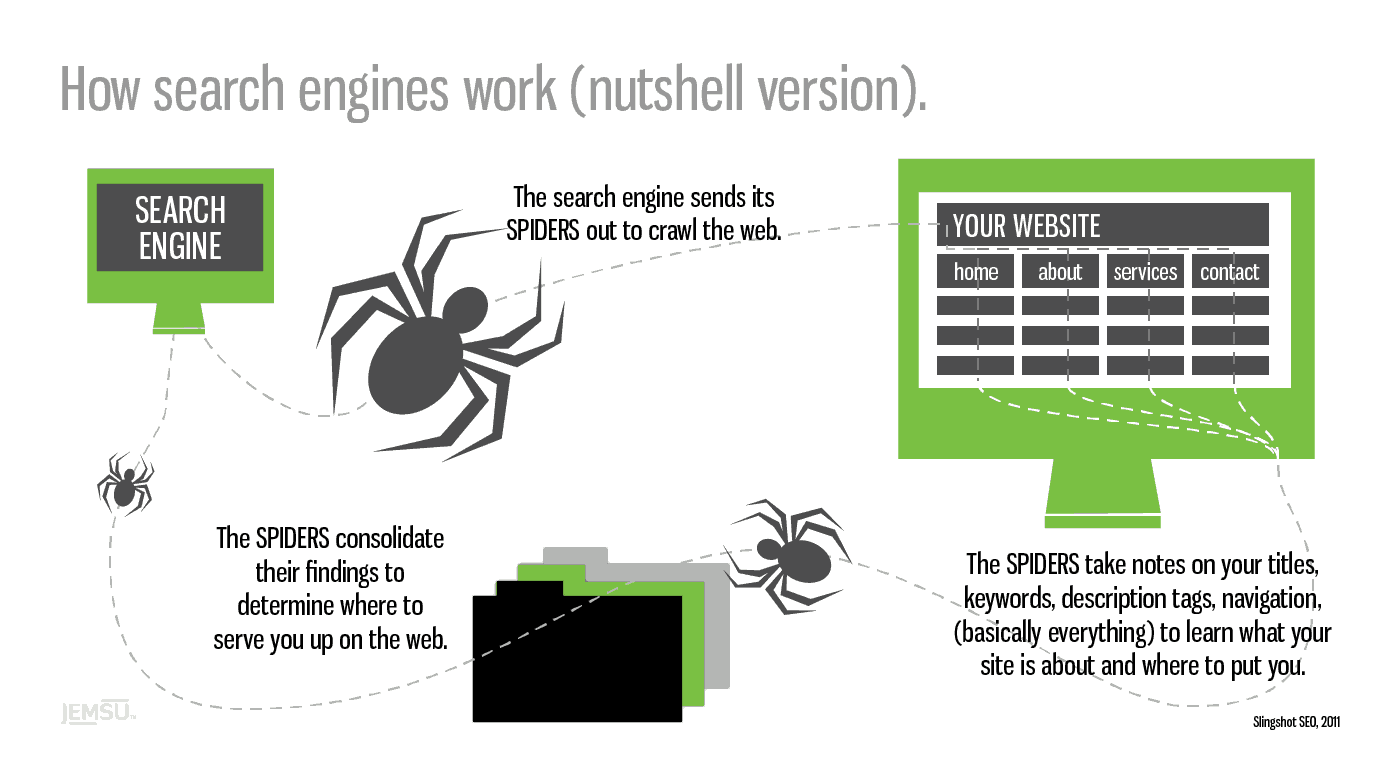
It’s your job to ensure that during this process, search engine bots can access your website without any blockings and that you assist them in completing this task as fast as possible.
This is known in the SEO World as Technical SEO.
You can do this by:
- Optimizing your robots.txt – Robots.txt is a file that gives search engines instructions as to which pages of a website they can crawl.
- Optimizing your XML sitemap – A sitemap lists all pages of a website search engines should know about.
- Finding and fixing any crawl errors – You can use the Google Search Console to find and fix crawl errors and make indexing more efficient and faster.
Recommended Reading: Technical SEO Guide – Best Practices for higher rankings.
2. Website Security (HTTPS)
One of the known ranking factors is website security. Websites that have an SSL enabled and serve links as HTTPS have a comparative advantage over non-secure websites.
By comparative advantage we mean that other things being equal, a website that has HTTPS enabled will rank higher than a website that is not secured.
If your website is not https yet, add this task on top of your list.
Recommended Reading: How to migrate your website to https without losing SEO.
3. Domain Authority
Next in the list is domain authority, a very important ranking factor.
Search engines want to show the best possible web sites in their results and one of the factors they use in deciding, is the authority of a domain.
The authority of a domain is determined by:
Domain age: Older domains tend to rank higher than newer domains. The average age of a page on the top results of Google is 3 years.
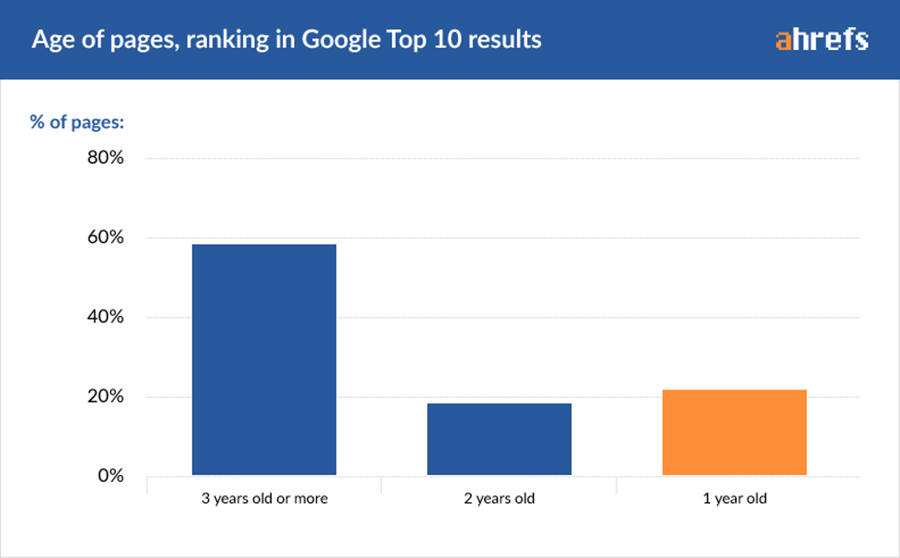
This does not mean that new websites cannot achieve high ranking but it is more difficult and it will take more time than established websites.
Domain status: A domain to be eligible to rank, it has to be free of Google penalties.
If you’ve owned your domain from the beginning then this is not something you should worry about. If you bought a domain that was already registered, you need to check that it’s free of Google penalties.
Recommended Reading: How to check if your website is penalized by Google.
Domain reputation: This has to do with how other websites (and people) perceive your domain.
One of the biggest factors, as we will see below, is incoming links but reputation is also related with what people say about your brand.
A domain with good reputation is more likely to achieve better rankings than a domain with no reputation at all.
Domain Authority: Google is using an internal metric called PageRank to calculate the authority of a webpage.
Websites that are in the top positions of Google have a higher PageRank than websites in the lower positions.
Google no longer gives information about PageRank so a number of companies (moz.com, semrush.com, ahrefs.com) came up with their own system to calculate the authority of a domain.
You can use these metrics as a guide to improve your domain score but this is not directly related with rankings.
Recommended Reading: Increase the authority of your domain by following these 7 practical steps and how to do SEO for a new website when you have a limited budget.
4. Mobile Friendliness
Another factor that is known to affect search engine rankings is mobile friendliness.
Mobile searches make up more than 60% of the total searches made on Google each month.
A website that is not optimized for mobiles, will not show up in mobile search results and this immediately excludes the possibility of getting any mobile traffic.
5. Webpage Speed (both Desktop and Mobile)
For a long time now, page speed is another known Google ranking factor. Google is obsessed about making the web faster and decided to reward faster websites with better rankings.
Having a fast website is also good for your users. Many studies have shown that slow loading websites are losing customers and driving users away.

To make your website faster, follow these proven tips:
- Upgrade your website software to the latest version
- Use a caching plugin
- Use the latest version of PHP (if you are on WordPress)
- Use a VPS hosting and not shared
- Use a CDN (Content Delivery Network) Service
- Optimize and compress your images
- Optimize and compress your HTMLS, CSS and JavaScript
6. Content Quality
The quality of the content you publish on your website is by far the most important SEO ranking factor of all.
When we talk about content that is published online, quality is measured using these three factors:
- Uniqueness
- Expertise – Authority – Trustworthiness (EAT)
- Relevancy
Content Uniqueness
First in the list is uniqueness. Any piece of content that is published on your website has to be unique and not a duplicate of what is already available on other websites.
This means that re-publishing an article from Forbes because you found it interesting (even if you properly cited the source), won’t help your website rank.
Google knowns that the particular article first appeared on Forbes and it will just ignore yours.
It won’t punish your website for this but it won’t reward it either. But, if you keep publishing duplicate content and have no unique content of your own, this will reduce your ‘Google Trust’ and make it very difficult to rank on Google.
Recommended Reading: What is thin content – A guide on how to find and fix thin content pages.
Expertise – Authority – Trustworthiness (EAT)
Search engines don’t want to show untrusted content in their search results. During the ranking phase they look for signals to help them identify content written by ‘experts’ who have ‘authority’ and ‘trustworthiness’.
This is not a new concept but Google raised its importance by adding it in the Google’s Quality Raters Guidelines.
It particularly states that E-A-T is applicable for all types of websites and it gives some examples of how E-A-T can be applied in practice.
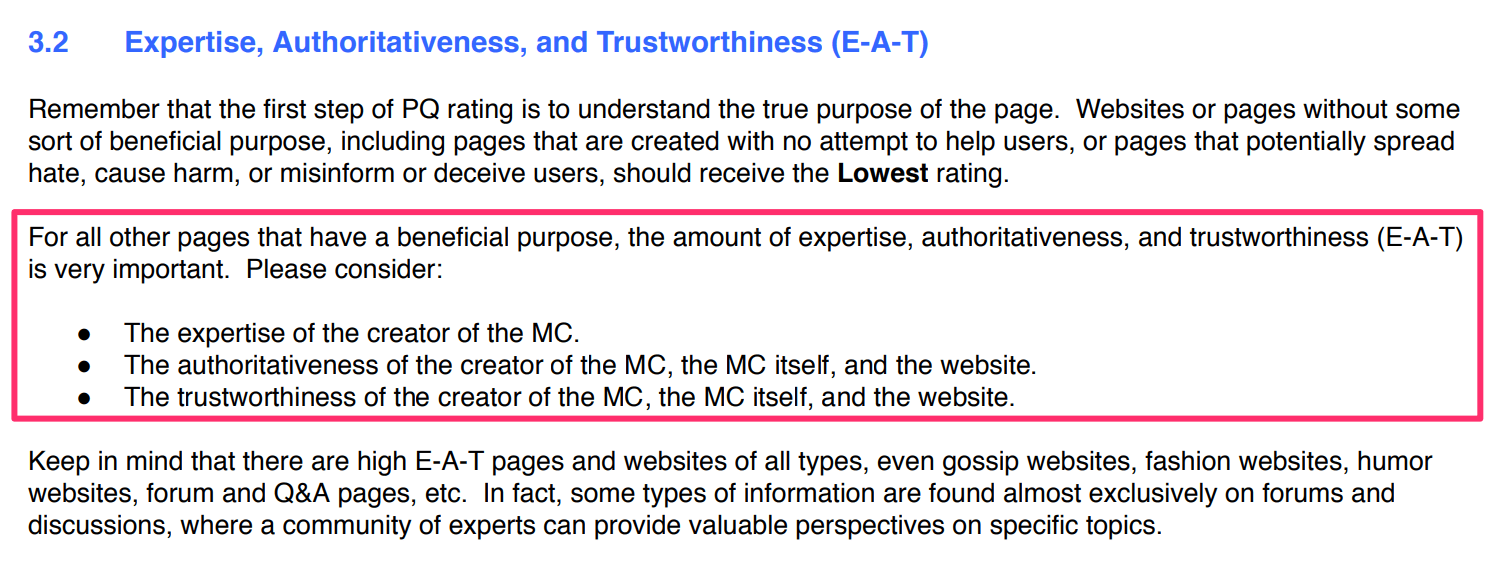
What you should do to improve E-A-T is the following:
- Make sure that each page has an author. You can add the author bio at the bottom of each page with a link to the full author bio.
- Make sure that your ‘About’ page explains who you are and why your company and authors are experts on the topics.
- Showcase any awards or mentions from trusted websites that can prove your authority.
- Invest in promoting your personal brand and the reputation of your authors.
- Make sure that your website is secure
- Try to get good reviews published in other trusted sources. Depending on your niche you may seek reviews in Google My Business, Yelp, Trustpilot, BBB etc.
- If applicable try to get a Wikipedia page for your website and authors
- If you are selling products or services online, make sure that you have a privacy policy and a refund policy.
- Get mentions on authoritative sites like major news publications, big forums, leading industry websites.
Recommended Reading: Google Search Quality Evaluator Guidelines
7. On-Page SEO Ranking Factors
Besides proving to search engines that they can ‘trust’ you, you also need to give them signals through your page structure to help them understand the meaning of your content.
This is what On Page SEO is all about.
This is achieved by sending them the right signals through your content and in particular:
Does your page title match what the user is searching?
The page title is the most important on page SEO factor. This is what users see in the search results and it is one of the elements used by search engines to get a very good idea of what a page is all about.
To optimize your titles for both users and search engines, you need to ensure that they include SEO keywords.

SEO Keywords are the exact phrases users type in the search box. By including keywords in your title, search engines can associate your content with specific search queries and this increases your chances of ranking for those terms.
It also encourages users to click on your search snippet since it closely matches what they are looking for.
Recommended Reading: How to optimize your page titles
Headings and Subheadings
A well-optimized page structure has headings and subheadings. Headings make the page easier to read by both search crawlers and users.
In most cases, a page has one H1 heading and multiple subheadings (h2 and h3). These are laid out in a hierarchical structure i.e. H1 -> H2 > H3.
Headings should also include keywords and phrases users can recognize.
Recommended Reading: How to optimize your website headings
Internal Link Structure
Internal links are links pointing to pages on the same website.
Each and every piece of content that you publish on your website needs to have at least one link pointing to another page on your website.
Internal links should be placed in the BODY of the page and should be relevant to the content.
By adding internal links to your content:
- You assist both search engines and users discover more pages on your website.
- Help in building topic relevancy
- Gives users more information about a topic
Recommended Reading: Internal linking best practices for SEO.
Image and multimedia elements Optimization
Search engines don’t only index text content but they also index videos, audio (podcasts) and of course images.
The problem is that non-text elements are difficult to be interpreted accurately by crawlers.
It is thus important to optimize them for SEO by giving search crawlers the necessary signals.
For example:
- For images, you can optimize the filename and also provide for an ALT text.
- For videos, you can add a video schema.
- For podcasts you can add the podcast schema.
There are various ways to make non-text elements easier to index. The following guides can help you out:
- SEO for Images: A complete guide on how to SEO optimize your images
- Schema Markup – An introduction to schemas and structured data and how they can help you improve your rankings.
Add Semantically Related Keywords in Content
Last but not least, one factor that can affect the position your website appears in Search is the use of the keywords within your content. This is known in SEO as Content SEO.
Content SEO can help you pick up the right keywords to embed in your content so as to make it more relevant to what the user is searching.
Besides adding your main keywords in the titles and headings (as mentioned above), you also need to add semantically related keywords in your content.
Semantically related keywords are words or phrases that are related to each conceptually.
Look at the following example:
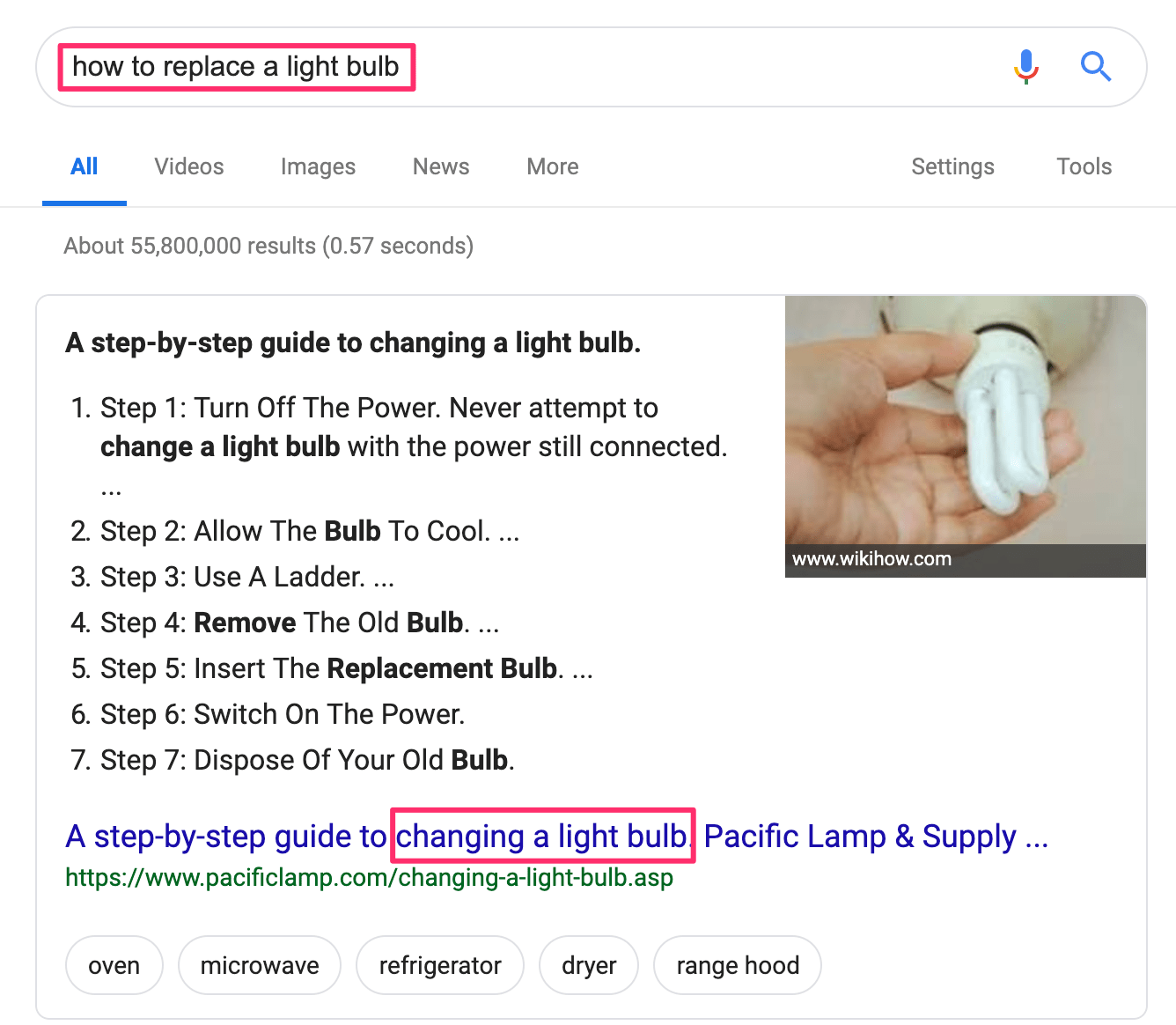
Google can understand that the meaning of the words ‘replace’ and ‘change’ are the same (in this context).
Recommended Reading: You can read my SEO keywords guide for more information on how to find and use semantically related keywords in your content.
8. User Experience
One of the signals used by the Google ranking algorithm is RankBrain. RankBrain is using artificial intelligence and machine learning to rank websites based on user experience and behavior.
So, the ranking algorithm considers all the factors discussed in this article and it also uses input from RankBrain before making a final decision.
Some of the signals used are:
CTR (clickthrough rate) – CTR is the percentage of people that click on a search snippet that shows in the SERPS.
If the system spots a pattern where more people click on a search snippet that is lower in the results than what is on the top, the algorithm may push that snippet higher in the page.
Pogosticking – When users click on your search snippet, visit your website and immediately go back to the search results, then this is an indication that they are not happy with the what they saw.
Bounce rate and dwell time – Similar to pogosticking, users visit your website and leave immediately because they did not find the information they were looking.
Recommended Reading: How to reduce your bounce rate
9. Brand reputation
This SEO ranking factor doesn’t have to do with backlinks (we will deal with links below), but with the importance of having a good brand reputation.
Brand reputation is this context means to have a community of people talking and mentioning your brand in the online world.
Mentioning doesn’t necessarily mean adding a link back to your website but simply discussing about your brand in the different social networks and forums.
From a webmaster’s perceptive, you should do everything you can to promote your brand online. Whether it’s through Facebook, Instagram, Twitter or popular forums in your industry.
If you get people to talk and search for your brand name in Google, this will eventually translate to a strong signal for the ranking algorithms.
10. Links from Trusted Websites
Back in the 90’s the Google founders, came up with a brilliant idea.
Websites that have backlinks pointing to them from other websites, are more useful and popular than others and thus deserve a higher position on the Google search results.
That’s a very simplified version of how Google ranking used to work back in the early days.
Over the years people took advantage of this and started building hundreds of links to their websites and as a result the quality of the Google search results was diminishing.
To protect their reputation and improve the quality of the results, Google adjusted their algorithm and changed the way backlinks are accounted for.
Links are still one of the most critical ranking factors, but it’s no longer a matter of which website has the most links, but from where the links are coming.
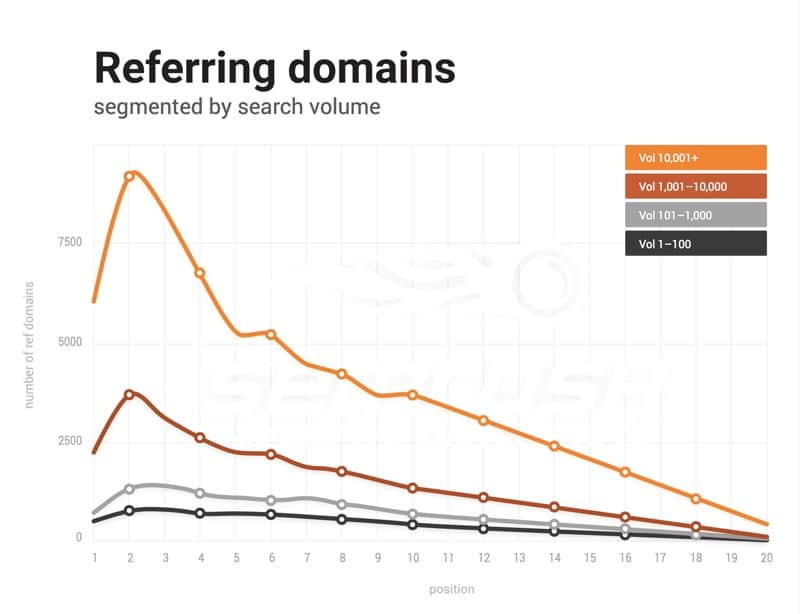
Links that can influence your rankings are the ones that come from:
- Google trusted websites
- Websites that demonstrate Expertise, Authority and Trustworthiness
- Related Websites
- Links that don’t have the nofollow attribute (
- Links that are included in the body of a webpage
- Links that are naturally added by the webmasters and not a result of link exchanges or buying links.
The following guides can help you build a strong link profile that will help you with rankings:
- How to remove bad backlinks from Google
- How to approach link building and boost your SEO
- Link Building techniques that actually work
- What is Off Page SEO
SEO Ranking Factors Summary
If you are new to SEO and Search Engine Marketing, what you need to understand is that Search Engines are constantly working on improving their search results. They do this by getting feedback from the users and through machine learning.
They gather and analyze this information and then adjust the search engine ranking factors to improve the user experience.
Your job as an SEO expert is to follow these changes and stay in compliance with the new rules.
It should be noted though that while algorithms are changing all the time, the basic ranking factors remained the same since the beginning of Google:
- Publish great content to satisfy the user intent
- Make your website accessible to search engines
- Build fast and secure websites
- Get ‘votes of trust’ (links), from other websites on the Internet to prove your Expertise, Authority and Trustworthiness
Websites that follow the above rules enjoy high search engine rankings and are more likely to survive the competition for years to come.
Websites that take shortcuts and try to trick search engine algorithms, can achieve temporary success but sooner or later they will get caught and penalized.
Any important SEO ranking factors missing from the list? Let me know in the comments.
The post 10 Most Important Search Engine Ranking Factors (2019 Update) appeared first on reliablesoft.net.
